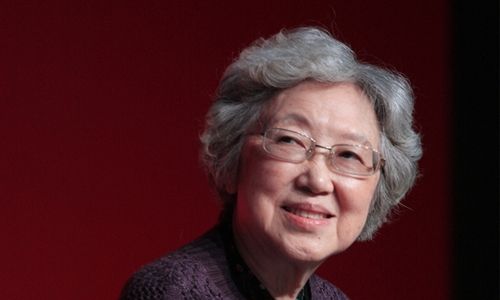Is Lady ZI Zhongjun an Old Cynic?

Today the social media group composed of my university colleagues underwent an interesting, if not bitter, discussion about who Ms Zi Zhongjun is. Having experienced incredible ups and downs in her life, this extraordinarily talented lady has become a well-known critic with her sharp-eyed, deep-going, relentless and passionate arguments on current issues home and abroad. Some believe she is no more than an old cynic who let out her anger in a destructive way, probably only to harm her own mental health. Some insist she is inspiring in truth-finding, using her influence to provoke thoughts, promote debate and pursuit for a healthier nation.
Zi was born into a wealthy and scholarly family in Shanghai in June 1930. Her father was a banker and financier, graduated from Kyoto University, University of Pennsylvania and Harvard University. After Yaohua High School, Zi entered Tsinghua University in 1948, majoring in English language and French language in the Department of Western Languages and Literature. Upon graduation, she was assigned to the Chinese Ministry of Foreign Affairs. From 1956 to 1959, she was stationed in Vienna as a diplomat. She and her family endured big agony during the Cultural Revolution. From the 1980s onward, she worked for China Institute of International Studies, stayed at Princeton University as a researcher, and worked at Chinese Academy of Social Sciences. After retirement in 1996, she was invited to function as a director and an exchange professor at John-Hopkins Center of Nanjing University (where I studied and worked) from 2000 to 2005.
Her publications include „In the 20th Century America“, „On the Shore of Ocean of Knowledge“, „American Diplomatic History“ and „American Research“. Besides, she was the traslator of „Civil Servant“ by Honoré de Balzac, „Oh, the Pioneer“ and „The Bohemia Girl“ by Willa Cather, „The Bridges of Madison County“ by Robert James Waller as well as „Philosophy“ by Alain de Botton.
Lately, she was summoned for a „talk“ by the concerned officials for openly accusing the party of falsifying its history, for advocating constitutionalism and for saying at a conference that there were no new things at the 18th National Congress, if any, they were backwards.
But the stubborn, almost 90-year-old lady can’t keep silent. She spoke out recently that there are indeed people who don’t like the leadership of the party, those who used to be passionate about it. „We must all think about it“, she said, „especially the top leaders.“
She mentioned the topic of anti-corruption. „What is anti-corruption for?“ she challenged, „Is it to protect the interests of the people, or to borrow a few heads to stabilize the mood of the people, to preserve the ruling status of the party?“
Ms Zi predicted that in today’s changing world, the party can’t assure that the people will always follow it. She suggested that the party’s leadership recognize mistakes to obtain the understanding of the people, allowing them in this way to follow willingly. She attacked on the propaganda departments, mainstream media, including movies, television, drama, music and cultural arena , also textbooks for schools for only talking about the great achievements in China since the reform and opening-up.
The party should ponder more on the past so as to avoid the similar mistakes, Ms Zi pointed out. „If there is a mess, should the party not be responsible for it?“ she asked, „Can the party leadership be strengthened by only singing the praising songs?“
“Concerning prestige and ruling power, China has no other power to replace the party,” Ms Zi reassured, „I also hope that the party will continue to be strong and always govern.“ However, she continued, there should be long-term coexistence, mutual supervision and aid with other social organizations and forces. „Other political parties and social organizations should be tolerated, allowed, supported, and encouraged to operate, develop, and participate in the administration of state affairs within the scope of the constitution. „
What would happen to Ms Zi is a question mark. It might depend on if she is interpreted by the authorities as a mere old cynic or a dangerous figure with ill intentions. Ms Zi is not a singular phenomenon in China, though. That might complicate the matter. The discussion at the above-mentioned social media group shows that there are sharp discrepancies about how to understand such personalities. The participants of the discussion, scattering around the world, do not geographically share the same opinion, which is an interesting point to observe.

Be the first to comment on "Is Lady ZI Zhongjun an Old Cynic?"